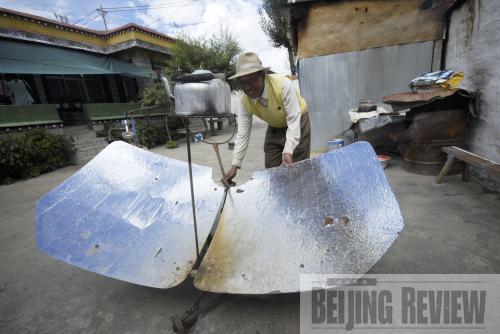|
The region has also reconsidered its strategy in the development of the mining industry. As of January 1, 2006, Tibet banned placer mines and, as of January 1, 2008, exploration for placer iron was also banned in Tibet. "If it damages ecosystem of Tibet, even digging for gold would not be permitted," Zhang said, quoting Qiangba Puncog.
Only large mining projects are permitted in Tibet, according to Zhang, and even these are limited to minerals such as copper, lead, zinc, cadmium and iron. The region is also the first in the country to regularize environmental protection during the exploratory phases. Enterprises are mandated to devise schemes for environmental protection, and the government will supervise their implementation.
Tibet also guides enterprises in clean production and the comprehensive utilization of resources. For example, the Tibetan Traditional Medicine Pharmacy Factory received appropriations of 1.2 million yuan ($175,695) and 1.8 million yuan ($263,543) in 2005 and 2007, respectively, for its clean production project.
At present, the factory has realized zero sewage emissions, since all sewage residue is recycled to water the lawn within the factory grounds. Meanwhile, the factory has also released zero emissions of dust and noise levels during the production process, Gonggar Norbu, head of the factory, told Beijing Review.
New fuels
 |
|
SUN HEATER: Balsang, a farmer in Lhasa, boils water with solar energy at his home (WEI YAO) |
Balsang is a farmer living in Baiding Village of Chengguan District, Lhasa. His family used to use gas bottles for cooking. Each year, he had to pay 600 yuan ($87.85) to buy gas bottles from the urban area of Lhasa.
But last year, his township built methane-generating pits in three houses of the village for trial use and Balsang's family was one of them. Now they use methane to cook, solar energy to boil water and require just 2,000 kg of cow dung for heating in winter. Now, every year the family only spends some 200 yuan ($29.28) for their energy needs.
In Tibet, firewood and cow dung used to be the most important fuels for people in agricultural and pastoral areas. But a massive use of firewood may lead to lumber cutting in a destructive manner, thus leading to pasture degradation.
For factors of low oxygen content in Tibet and the simple stoves, the utilization efficiency of firewood is low—not only wasting resources, but also influencing quality of life.
Now Tibet is vigorously promoting substitution of traditional fuels in the agricultural and pastoral areas. According to TEPB figures, 155,700 methane-generating pits are being planned for 51 counties in the region, promising to provide methane for 778,000 farmers and herdsmen.
In the meantime, use of solar cookers and solar heaters are actively encouraged in Tibet, and the region now has a total installed capacity of 9,000 kw for photovoltaic power plants using solar energy.
The promotion of new fuels, in addition, brings direct economic benefits for farmers and herdsmen. "Every rural household can save an average of 1,000 yuan ($146.41) on fuel every year," said Zhang.
|

